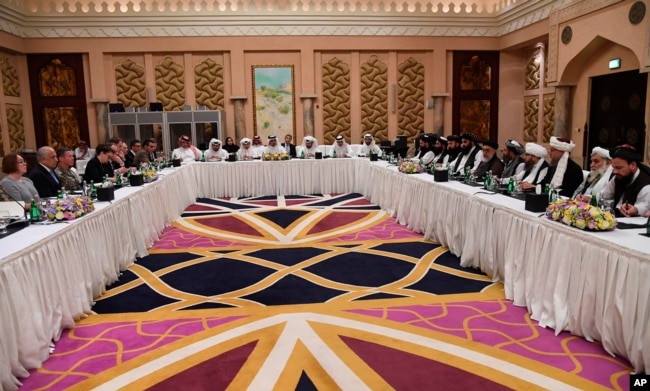Authorities in Afghanistan say a military-led counteroffensive has evicted the Taliban from a strategically important district in northeastern Badakhshan province, inflicting heavy casualties on retreating insurgents, VOA news reports.
The Taliban had late last week overrun Arghanj Khwa, located in the vicinity of the provincial capital of Faizabad, disrupting links with at least 10 other districts in the mountainous Afghan province near the border with Pakistan and China.
Interior Ministry spokesman Nasrat Rahimi said in a tweet the clearance operation in the district ended Tuesday, killing at least 14 insurgents and injuring several others. A provincial government spokesman, Naik Mohammad Nazari, told VOA airstrikes against Taliban positions forced the insurgents to retreat from the district.
The Taliban claimed its fighters “abandoned” Arghanj Khwa and took new positions about a kilometer away after transferring all seized military-related equipment from the district.
“Enemy claims of retaking the district headquarters in a military operation and causing (Taliban) casualties is fabrications,” Taliban spokesman Zabihullah Mujahid asserted in a brief statement sent to journalists.
The Taliban, which controls or contests more than 50 percent of Afghan territory, has stepped up attacks on Afghan forces across many provinces in recent weeks, reportedly killing or injuring hundreds of security forces in March. Two American special forces troops were also among the battlefield fatalities.
Afghan officials cite preemptive counter-Taliban offensive operations this year ahead of spring fighting season for an intensification in clashes and increased casualties. The offensives, they say, have killed scores of insurgents.
Continued Afghan hostilities are also causing record levels of civilian casualties after more than 3,800 Afghan civilians were killed in 2018, the highest number of fatalities in the past 10 years.
US-Taliban talks
The spike in violence comes as U.S. and Taliban representatives are expected to start a new round of negotiations later this month in search for a political settlement to the Afghan war.
Both the sides reported progress at the end of the last round of talks concluded in early March. The issues in focus were a timeline for the U.S. military withdrawal from Afghanistan and Taliban’s assurances to disallow terrorist groups from plotting international attacks from the country.
“No date has been fixed for the next meeting (with the U.S. team) as of this moment. But we believe it would certainly happen because a continued dialogue process could only lead to a resolution of the problem,” a senior Taliban official told VOA Tuesday. He spoke on condition of anonymity.
“There is no other option because the other option is war and that has been going on for the past 18 years,” said the insurgent official.
U.S. chief negotiator Zalmay Khalilzad is visiting Kabul where he met with President Ashraf Ghani and prominent Afghan opposition leaders as well as civil society representatives to share with them details of his talks with the Taliban before his next meeting with insurgent negotiators. Khalilzad has emphasized that Afghan leaders in and outside of the government need to form an inclusive negotiating team for a peace dialogue with the Taliban.
“While Afghans alone will decide the composition of their delegation for talks, women must be at the table during all negotiations about peace and Afghanistan’s future,” the Afghan-born U.S. diplomat tweeted Monday.
Khalilzad has repeatedly said any final agreement with the Taliban will be linked to a comprehensive cease-fire and intra-Afghan talks.
Meanwhile, Afghan opposition politicians, civil society, as well as youth representatives, and tribal elders, are also scheduled to hold another round of their unofficial talks with Taliban delegates in Qatar in mid-April. The last round of the intra-Afghan dialogue process was held in November in Moscow, but the Afghan government had boycotted the meeting and it is not clear whether Kabul will participate in the upcoming talks.
Ghani insists any negotiations with the Taliban must be led by his government, but the insurgents refuse to engage in a peace process with the government, denouncing it as an illegitimate entity.

